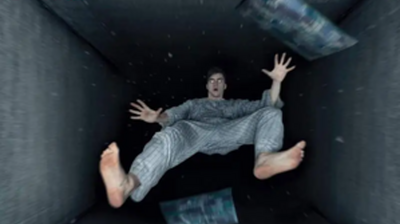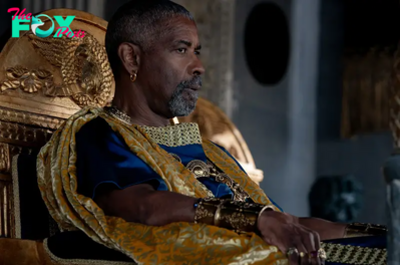Entertainment
Netflix’s 3 Body Problem Transforms a Dense Sci-Fi Novel Into a Smart, Gripping Thriller
Netflix’s 3 Body Problem might be the biggest TV series to hit Earth this year. The Science-fiction epic unites Game of Thrones creators David Benioff and D.B. Weiss with The Terror: Infamy co-creator Alexander Woo in an adaptation of one of the 21st century’s most celebrated books. Chinese author Cixin Liu’s Hugo-winning The Three-Body Problem—published in his home country in 2006, then expanded into a trilogy that has been translated into dozens of languages—is a fascinating novel of ideas. The cover of the American edition boasts an endorsement from Barack Obama, who calls it “wildly imaginative.”
It certainly is. Choppily written, dense with theoretical physics and philosophy, and dependent on the depiction of an alien race whose physical form is never described, the book also poses unique challenges for anyone looking to adapt it for the screen. Benioff, Weiss, and Woo have been remarkably successful at transforming Liu’s work into a gripping sci-fi thriller (premiering March 21), without either dumbing it down or boring viewers with hours’ worth of whiteboard lectures.
The first of two interconnected storylines, set decades apart, follows a brilliant young astrophysicist, Ye Wenjie (played by Zine Tseng and later Rosalind Chao), during the Chinese Cultural Revolution of the 1960s. After the revolutionaries’ anti-intellectual reign of terror destroys her family and an encounter with Rachel Carson’s contraband Silent Spring further iNFLames her pessimism about the human race, Ye is recruited to work at a remote, mountaintop Military base on a secret initiative known as Red Coast. One choice she makes there will reverberate around not just the globe, but also the universe.

Meanwhile, in 2024, scientists are dying by suicide. This might have something to do with the fact that, as Saul Durand (Jovan Adepo) puts it, “science is broken.” The Oxford physics grad’s work as a research assistant at his alma mater has suddenly stopped yielding comprehensible results. His friends from college are having similarly inexplicable experiences. Auggie Salazar (Eiza González), the founder of a cutting-edge nanomaterials startup, begins to see fiery numbers flash across her field of vision—a countdown, but to what? Star physicist Jin Cheng (Jess Hong, excellent) gets sucked into an uncannily immersive VR game of mysterious origin, which is also the setting for the most inspired of the show’s breathtaking visuals. Rounding out the crew are Jack Rooney (John Bradley, Thrones’ beloved Samwell Tarly), who dropped out of Oxford to found a multimillion-dollar snack-food empire, and Will Downing (Alex Sharp), a soft-spoken high school physics teacher who’s secretly in love with Jin.
With help from a gruff, rule-breaking intelligence operative (Benedict Wong’s Da Shi), the so-called Oxford Five seek out an explanation for the crisis wreaking havoc on their field. These U.K.-based characters constitute the Netflix adaptation’s biggest departure from Liu’s novel, in which their roles are filled by a single present-day protagonist: a bland nanotech scholar in China who spends much of the book completing RPG-style missions. The creators’ decision to relocate this part of the story to England and add a clique of cool 30-somethings might seem like pandering to a Western TV audience. And maybe it is. But it also allows 3 Body’s characters to talk through the book’s most difficult philosophical and scientific questions, and grounds its central concern—the fate of humanity—in the relationships between regular people.

What resonates most about the series is its ambivalence about the prospect of an alien civilization annihilating humanity. The Oxford Five’s debate on the matter does seem timely, in a world where, in a state with anti-trans policies, a non-binary teen dies a day after being beaten at school; and the massacre of 1,200 people in one country is answered by the killing of 30,000 people and counting next door. Even without extraterrestrial meddling, scientists’ decades of warnings about the climate crisis didn’t prevent 2023 from setting a record for carbon emissions from fossil fuels.
In China, despite his insistence that it’s just a story, Liu’s trilogy has been interpreted as an allegory for China’s geopolitical predicament: while the Chinese embody the outmatched but tenacious human race, Western powers are the space aliens using technology to force them into submission. But the series highlights more compelling parallels between the threat of climate change and 3 Body’s depiction of a planet that must innovate for the sake of future generations. It’s the rare apocalypse epic that does justice to the enormity of an international project to save the world. As one character points out: “The last time we gave the best physicists in the world insane resources, they gave us Hiroshima.”
We may hear some grumbling from fans who savored the books’ work-showing, in lengthy government reports and painstaking accounts of aliens’ experiments with protons. The heart of this story isn’t an equation, though. It’s an inquiry into the nature of human civilization and the role of scientific progress in our salvation—or our doom. Netflix’s 3 Body Problem sometimes tries too hard to be cool, sprinkling in Lana Del Rey needle drops and recreational drug use. But ultimately, the creators succeed in extracting the story’s urgency without lobotomizing the source material.
-

 Entertainment2h ago
Entertainment2h agoAmerica On CoffeeWe’re simply inviting you to take a timeout into the rhythmic ambiance of our breakfast, brunch and/or espresso alternatives. We’re comfortable everytime you cease by.Vacation Espresso Cocktail
-

 Entertainment2h ago
Entertainment2h ago12 Methods to Command a Stage
-

 Entertainment2h ago
Entertainment2h agoBeyonce to Headline Halftime Show During NFL Christmas Game
-

 Entertainment3h ago
Entertainment3h agoDid You Correctly Answer This Poughkeepsie Related Jeopardy Question?
-

 Entertainment9h ago
Entertainment9h agoChanges Made in New York to “Men Working” Construction Signs
-

 Entertainment12h ago
Entertainment12h agoSuggestions for delivering a POWERFUL OPENING.
-

 Entertainment12h ago
Entertainment12h agoAmerica On CoffeeWe’re simply inviting you to take a timeout into the rhythmic ambiance of our breakfast, brunch and/or espresso picks. We’re completely happy everytime you cease by.BAD DREAMS – TEDDY SWIMS
-

 Entertainment18h ago
Entertainment18h agoRemembering Song Jae-rim: A Look at His Best Movies and K-Drama Performances

















